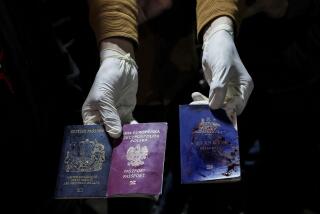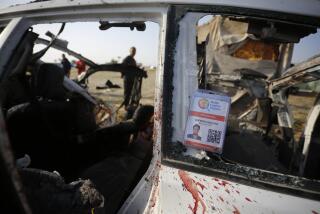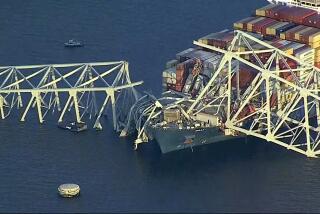Iraqi Insurgents Kill Two More Western Civilians
- Share via
MOSUL, Iraq — Two Europeans were shot to death south of Baghdad on Tuesday, a day after four American missionaries were slain in this violence-prone northern city in a growing campaign by insurgents against Western civilians.
A German contractor and a Dutch colleague were killed while working on a water project 45 miles south of the capital, a region that had seen repeated strikes against troops and people who work for the U.S.-led coalition. Their Iraqi driver and a police guard were also killed in the attack.
Two other Iraqi policemen and an interpreter with the U.S. military were gunned down in other incidents Tuesday, as guerrillas continued to target Iraqis working for occupation authorities. Last week, two civilians working for the coalition and their interpreter were shot to death south of Baghdad.
Lt. Gen. Ricardo Sanchez, the top U.S. commander in Iraq, said the attacks on humanitarian workers were an attempt at intimidation.
“Clearly there has been a shift in the insurgency and the way the extremists are conducting operations,” Sanchez said at a military ceremony in Tikrit. “It is very clear they are going after these targets that might create some splits within the coalition.”
On Monday, the American missionaries came from their base in Dahuk in Kurdish-controlled northern Iraq near the Turkish border, hoping for guidance from the U.S. Army about how to relocate safely to Mosul. U.S. military officers told The Times they had met with the aid workers shortly before their deaths.
The meeting had gone well, and by the late afternoon the group of five climbed into a Nissan Patrol and began the drive home. A short time later, police theorize, a car pulled beside the group on the eastern edge of Mosul and opened fire.
By the time an off-duty policeman came upon the car, three were dead and two were badly wounded. By day’s end, another had died in a helicopter en route to Baghdad.
The group included Larry T. Elliot, 60, and his wife, Jean Dover Elliott, 58, of Cary, N.C. They had been missionaries for the Southern Baptist International Mission Board since 1978 and had transferred to the Middle East in February. The others, Karen Denise Watson, 38, of Bakersfield and David E. McDonnall, 28, and Carrie Taylor McDonnall, 26, of Rowlett, Texas, had been missionaries for a year or less. The only survivor, Carrie McDonnall, was in critical condition.
U.S. Army Maj. Cindy Glenister of the Stryker Brigade at the Mosul compound remembered meeting the five on their first visit with the military about two weeks ago.
They were discussing the possibility of the McDonnalls coming to Mosul to work with the destitute. Glenister, who deals with nongovernmental organizations in the region, said the group worked on water purification in the Kurdish-held territory.
Glenister said she had told them that a problem that needed particular attention was the displaced civilians who had no special status as refugees but were living in squalor in camps around Mosul.
“David and Carrie were going to find a place to live here in Mosul,” she said. “They came here just wide-eyed and open to anything they could do here.” Glenister said that Larry Elliott told her that he had worked elsewhere, but thought he could make more of a difference in Iraq.
“They seemed very aware of the environment they were working in,” she said. “I think they knew the risks they were facing.”
The group focused on the Jabar Rubber Factory area, where displaced Iraqis live with no running water. The group was already talking about trucking water tanks from Baghdad to Mosul. They got advice from local staff members in the compound about the city’s safer neighborhoods.
On Monday, they came to the compound for a final discussion on security. Glenister had another appointment, so Maj. Jerry Hick gave them the briefing on “how to move through battle space in a safe manner.” He said it was the first time since he’d been in Iraq that a nongovernmental organization of the Southern Baptist group’s stature had expressed an interest in Mosul. To him, it was a positive step for the city. Besides security concerns, the aid workers asked where the poorer parts of the city were and who the leaders were.
“The need for these kinds of people remains,” Hick said. “The terrorists took four lives and exacerbated the lives of thousands of their countrymen.”
To the south of Baghdad on Tuesday, it was a small-arms attack that took the lives of the German and Dutch contractors, as well as their driver and one of their two guards from the Iraqi Facilities Protection Service, said 1st Lt. Serena Wallace, a U.S. military spokeswoman. At least one other guard was wounded.
The Iraqi police chief for the area, Col. Aayed Omran, said the slain contractors were working near Razzaza Lake and that their group was armed because it had been attacked before.
The killings occurred a week after the slayings of two other Westerners, aid worker Fern Holland and press officer Robert Zangas, both Americans. They and their Iraqi interpreter were chased down in their car and shot at close range in Hillah, also south of Baghdad. Four Iraqi police officers are among six people arrested in that attack, and there has been speculation that Holland may have been targeted because of her work to create centers to help Iraqi women.
Special correspondent Roaa Ahmed Shawkat in Mosul and Associated Press contributed to this report.
More to Read
Sign up for Essential California
The most important California stories and recommendations in your inbox every morning.
You may occasionally receive promotional content from the Los Angeles Times.










